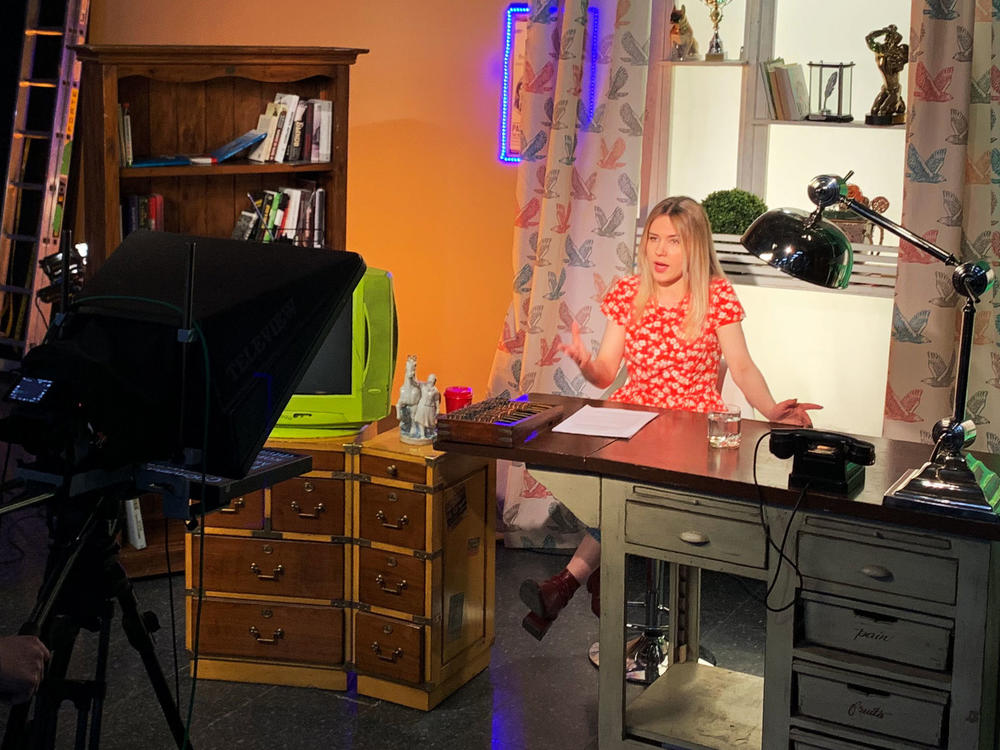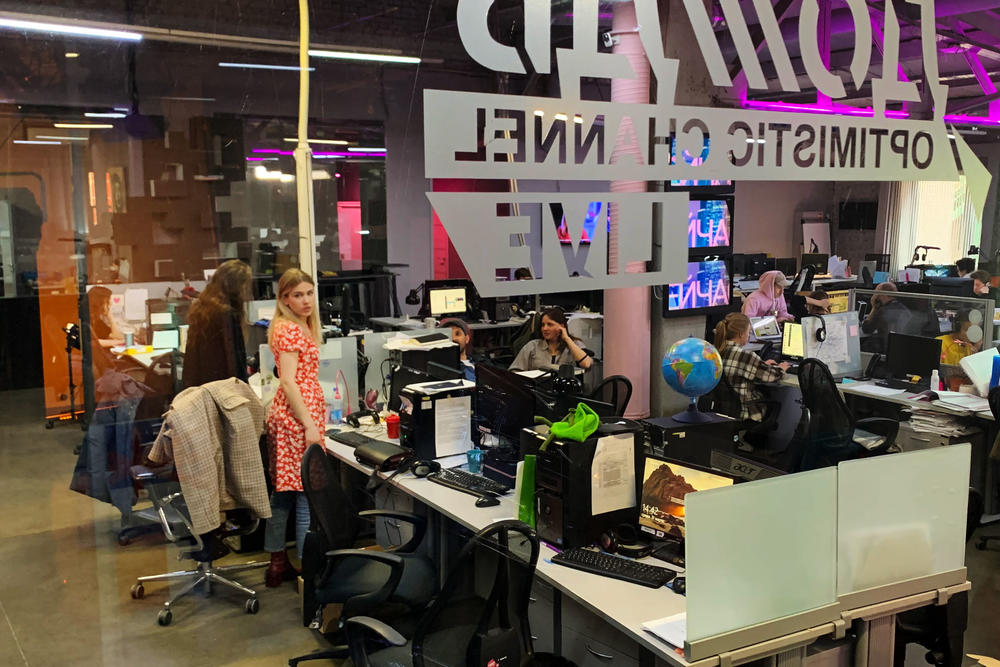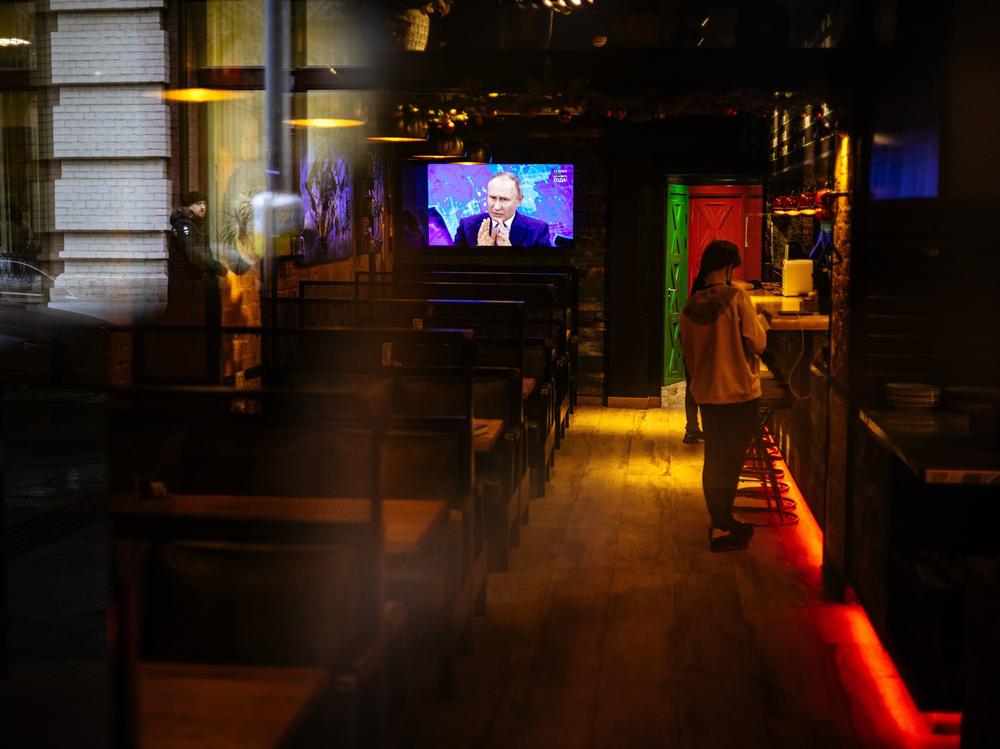Section Branding
Header Content
Russian Show 'Fake News' Wages Lone Battle Against The Kremlin's TV Propaganda
Primary Content
Editor's note: The fight against disinformation has become a facet of nearly every story NPR international correspondents cover, from vaccine hesitancy to authoritarian governments spreading lies. This and other stories by correspondents around the globe focus on different tactics to combat disinformation, the impacts they've had and what other countries might learn from them.
MOSCOW — Russian TV news has come a long way from the awkward, wooden newscasts of the Soviet Union. From their state-of-the-art Moscow studios, Russia's main channels — all government-run — beam out slickly produced news shows that reach tens of millions of people every day.
The overriding message is always the same: President Vladimir Putin is working tirelessly to help ordinary Russians and ward off aggression from the United States and its allies. The Kremlin's media machine tells Russians exactly what to think about everything from imprisoned opposition leader Alexei Navalny's political movement to the latest round of U.S. sanctions.
Although Russians can tune out via dozens of entertainment and sports networks, there is almost no news alternative to government propaganda on Russian television — save for one channel, Dozhd, also known as TV Rain.
Week in and week out, the channel, currently limited to the Internet, broadcasts a show called Fake News, which flippantly deconstructs the world according to the Kremlin. The program describes itself as a guide through the latest manipulations of state television.
In one recent episode, host Masha Borzunova skewered state TV for its newfound obsession with Navalny — whom it used to ignore — and the evergreen theme of imminent war with the United States.
"We don't choose our topics, our friends at state television do. We talk about what they talk about," Borzunova says after taping the show at TV Rain's studios in a converted Moscow factory.
"Propaganda isn't just about fake news or outright lies," she says. "State media can also tell just that part of the truth that's convenient for the government."
Fake News has picked up a loyal following on YouTube, where a weekly episode can easily get more than half a million views.
Moscow television critic Anna Kachkayeva says the show has become a brand of its own.
"This program is a very important part of the media landscape," she says. "It's not even so much about the exposure of fakes as it is about decoding what's happening on TV."
As for the TV Rain news channel, Kachkayeva says it has played a unique role ever since its founding in 2010 — when Dmitry Medvedev was Russia's president and many people hoped he would allow for a more open political environment.
TV Rain, which at first called itself "the optimistic channel," unexpectedly became an alternative to state television with its hard-hitting coverage of a January 2011 terrorist attack on a Moscow airport and a wave of anti-government protests later that year that government media largely ignored.
The channel's independence soon provoked the ire of officials. In 2014, Russian cable providers stopped carrying TV Rain, forcing the channel to go online and rely on a subscription service for revenue.
"The channel has turned out to be an alternative in an already very sanitized information space," Kachkayeva says. "It's the channel of the urban, educated class, not of a mass audience."
Television remains dominant in Russia, even as media consumption evolves. Last year, 73% of Russians called TV their main source of news, compared to 94% in 2009, according to polling by the independent Levada Center. At the same time, 39% of respondents also named online news sites and social media as their No. 2 and No. 3 news sources respectively, up dramatically in the same time period.
TV Rain's YouTube channel attracted 450,000 new subscribers and a record 190 million views in January and February this year, following Navalny's arrest and nationwide protests demanding his release.
Still, Natalya Sindeyeva, TV Rain's owner and founder, says the channel is constantly under threat of closure.
"The risks are enormous and unpredictable. I don't like to think about them," she says.
The channel's license could be revoked on a legal technicality, or prosecutors could open a criminal investigation. One reason TV Rain hasn't been shut down yet may be so the Kremlin can claim there is freedom of the press in Russia, Sindeyeva says.
Since Navalny's jailing, Russian authorities have cracked down on independent journalists with searches and detentions. After the government branded news site Meduza a "foreign agent" in April, it lost advertisers and is now struggling to survive. Following raids on the Moscow student magazine DOXA a month ago, Amnesty International said Russian authorities had launched an "all-out attack" on journalists.
Russia ranks 150 out of 180 countries in a rating of press freedom by Reporters Without Borders, which describes a "very oppressive climate" for critical Russian journalists.
The Kremlin maintains media are free to report what they want within the framework of ever-tightening laws.
Although her channel challenges the narratives propagated by state media, Sindeyeva rejects the label of "opposition media" for TV Rain. She paraphrases the Czech dissident Vaclav Havel, saying that the truth will always be in opposition to a system built on lies.
Disinformation in Russia is worse now than during the communist era, according to Sindeyeva. In Soviet times, people understood that government media lied, she says, but today there are so many sources of information that people don't know what to believe anymore.
"The main problem is not just that the level of lying is high, but that people don't recognize lies and very often believe them," Sindeyeva says.
That's where the show Fake News comes in, with hosts like Borzunova dissecting Kremlin propaganda every weekend.
At the end of her program, Borzunova calls on viewers to like it, share it — and show it to their parents and grandparents, the most likely consumers of state TV.
The audience typically leaves thousands of comments, thanking her for the show. "You've opened people's eyes," one viewer recently wrote.
Despite her channel's defiant stance, Sindeyeva says its main mission is not to fight propaganda, but to report on what's really happening in the world.
"Our job is to give people the chance to make up their own minds," she says. "As long as there are free spaces on the Internet, people should decide for themselves if they want to if they want to be deceived."
Copyright 2021 NPR. To see more, visit https://www.npr.org.



